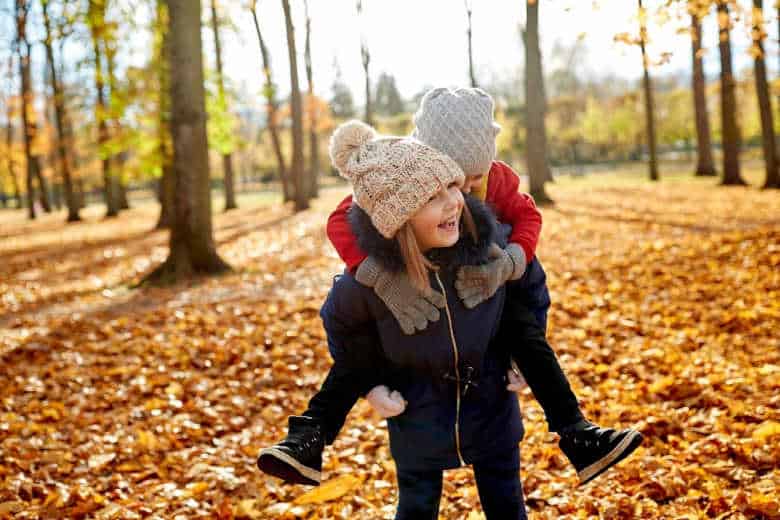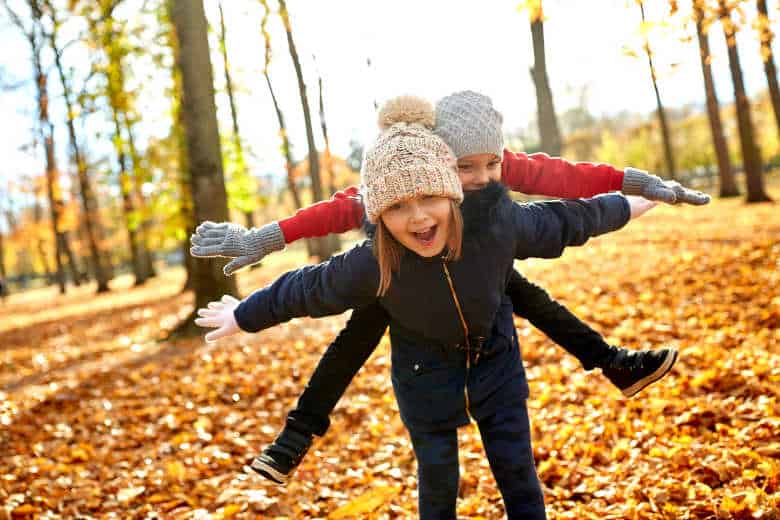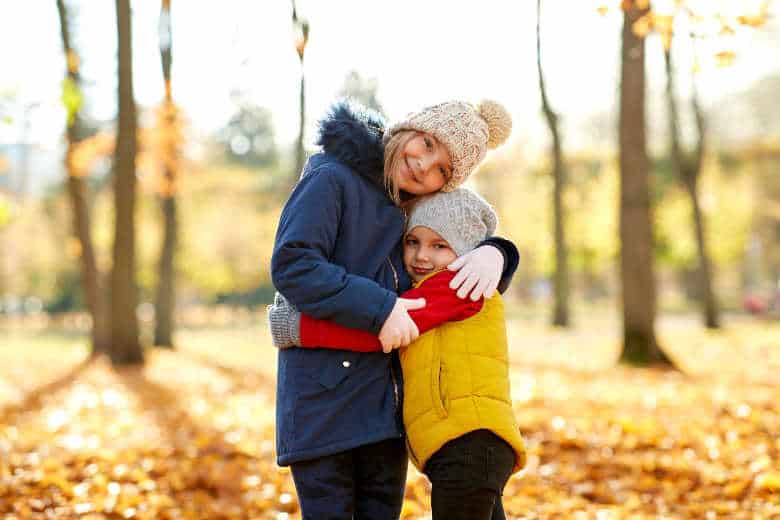Inside: Kids are instinctually kind, but we can help that instinct grow by doing acts of kindness as a family. The science of kindness is fascinating and holds important clues about how to foster the courage to be kind in our kids.
It was the end of the year party for my son’s preschool class. We all met at a park — the parents, teachers, and kids. I started chatting with a friend and realized I didn’t see my son on the playground. I turned around and saw him at the snack table, his two grubby hands wrist-deep in a bowl of cookies.
He grabbed two handfuls and started running, not to eat them himself, but to pass out to his friends. He passed them around (including to babies too young to have cookies Gah!) before I could catch up to him.

Looking back I can see how grabbing those cookies, while impulsive, was an act of pure generosity born out of excitement and joy. At the time, I was one exhausted mama just trying to keep my 3-year-old’s hands out of the cookie bowl!
Those instinctual impulses of generosity, kindness, and compassion are exactly what we should recognize in our kids and say to them: “Hey, what a kind thing to do, doesn’t it feel good to do good?”
Nurture and Thrive
Our kids may not always express those in instincts in the most mature ways, but they are still pure and good. They just need a little help in the execution.
If we can get our little ones to reflect on how doing good feels good, we can raise a generation of compassionate people. That is something this world sorely needs.
The Science of Kindness: Impulsive and Instinctive
Research has found that not only are toddlers happier when giving to others but when that giving is especially costly, they are even happier.
For example, if a toddler forgoes the treat themselves and gives it to someone else they show greater happiness than when sharing the treat!

This is not just true for young kids, but for older kids as well. Pre-teens (9 to 11-years-old) were asked to either do three acts of kindness a week (e.g. hug your mom if she is stressed, share your lunch), or keep track of pleasant places your visited places for a period of four weeks.
Both groups reported greater happiness at the end of the four weeks, but the effect was stronger in the group that did acts of kindness. And not only were those kids happier, but they also had greater peer-acceptance (being well-liked by peers) and psychological-well-being.
It all comes down to this: It feels good to do good.
We can’t (and shouldn’t) force our kids to share their toys or to think of others — but we can reinforce their natural tendencies to be kind, compassionate, and giving.
3 Ways to Encourage Acts of Kindness in Your Kids
1. Be on the Lookout for Kind Impulses
You may have to look past the expression or the behavior and think about your child’s pure impulse. Look past the grubby hands in the cookie bowl and see the joy of giving in your child’s eyes.
That doesn’t mean we don’t help them figure out another way to share the cookies rather than by the fistfuls, instead, we help them to channel and express their kindness in ways that are more socially acceptable.
Little kid’s acts of kindness are going to be clumsy and impulsive and oh so very pure. Don’t miss them! Notice them and help your littles to follow through.
2. Help Your Kids Develop a Kind Identity Through Reflection
When your child does something kind, you don’t need to “reinforce it” or “praise it.” Research shows that “rewarding” kids for kindness can undermine that pure instinctual drive to do good.
What you can do and should do is to help them reflect on it. Help your child develop a caring and kind identity by telling them they are a kind person. Then ask them, how did it feel to do that kind thing you did? Help them to bask in that warm glow feeling.
Teaching children to reflect is a core component of executive control and a core life skill.
Build up your child’s sense of self-worth by helping your kids think about how they feel when they do something kind. This will help to build an inner identity of kindness and compassion.
3. Help Your Kids Develop The Courage and Inner Strength to Act Compassionately Through Service Projects
It is one thing to feel compassion and generosity to those who we feel close to and who we love. It perhaps takes more courage to help people who are suffering, who may be different than us, or who haven’t treated us kindly.

It takes a great amount of courage as a kid to be the one who sticks up for a child who is being left out.
It takes a great amount of empathy to understand that other children may have different challenges than you have.
It takes a great amount of compassion to notice how others help us to survive and how other people may have greater needs than our own.
We want to expand on and grow those pure instincts and impulses of kindness our young children have and to do that we need to be intentional in helping them learn how to act on those impulses.
How do we do this? Kids learn by doing. Hands-on activities. And those skills of empathy, compassion, and courage come from practice.
Volunteer As a Family: Intentional Acts of Kindness
Volunteering has been linked to happiness and long-term psychological well-being, especially for teens. This may be partially true because it gives teens a chance to build self-worth from within, and is not yet another measure of achievement like grades, athleticism, college essays, etc.
Find something your teens are interested in or your family is interested in and let that guide your search for volunteer opportunities based on the season.
When you break it down into seasons it seems more manageable. Four times a year your family does an intentional thoughtful family activity that gives back. Here are some ideas:
- Adopt a family during the holidays
- Visit a retirement community or nursing home
- Help during a community clean-up day
- Participate in a food drive
- Help pack “flood buckets” at local churches or the red cross during Hurricane season
- Prepare treat bags for kids at the hospital who can’t participate in trick or treat
- Prepare blessings bags for when you see someone that is homeless
I hope that all of these ideas will help you harness those pure impulses your kids already have — notice them, help your kids reflect on them, and simply give them the opportunity to practice them and what a beautiful generation we will have raised.

 Icelandic Tradition of Jolabokaflod: Make This Your Coziest Holiday Yet With Hygge Stocking Stuffers
Icelandic Tradition of Jolabokaflod: Make This Your Coziest Holiday Yet With Hygge Stocking Stuffers